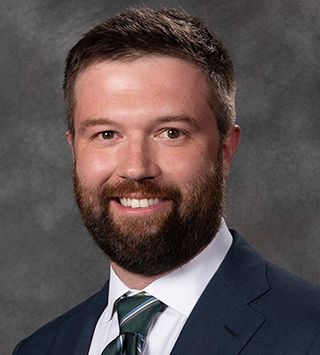James Fallows Tierney joined the Chicago-Kent College of Law faculty in fall 2023. He teaches courses in business law and administrative law. Before joining the faculty, he was an assistant professor at the University of Nebraska College of Law and a lecturer at Rutgers Law School. He became associate dean for academic affairs in summer 2025.
Tierney’s research focuses on how law shapes the way that ordinary people and financial markets interact with each other. He is an expert in the regulation of broker-dealers, investment advisers, and self-regulatory organizations such as stock exchanges. His research has been published or is forthcoming in journals such as the Yale Law Journal (main and Forum); Duke Law Journal (twice); Stanford Journal of Law, Business, and Finance; University of Pennsylvania Journal of Business Law (twice); Case Western Reserve Law Review; and the Nebraska Law Review. His article, “Investment Games,” about the regulation of gamified stock trading apps, was selected for the Harvard/Yale/Stanford Junior Faculty Forum in 2022.
Before joining academia, he practiced in the United States Securities and Exchange Commission’s Office of the General Counsel for five years, had a regulatory and appellate practice at Mayer Brown LLP in Washington, D.C., and clerked for Judge Mary M. Schroeder of the U.S. Court of Appeals for the Ninth Circuit. He has degrees from Brown University and the University of Chicago. Outside work, he is the treasurer and a board member of the nonprofit DSA Fund.
Education
J.D., University of Chicago Law School
M.A., University of Chicago
A.B., Brown University
Publications
Articles, Essays, and Book Chapters
- Retail investors and capital markets intermediation, in Deborah DeMott and Cheng Han Tan, eds., Agency and Intermediation (Edward Elgar, forthcoming)
- Trading Acres, with Jessica Shoemaker, forthcoming in Yale Law Journal (2025-26)
- Jarkesy’s Stakes for the SEC, forthcoming in Duke Law Journal (2025)
- Fair arbitration for investment advisers, with Adam Gana and Zahra Hodjat, forthcoming in Case Western Reserve Law Review (2025-26)
- Overseeing Private Rulemaking: Evidence from SEC review of SRO rulemaking, forthcoming in University of Pennsylvania Journal of Business Law (2025)
- Absentee ownership and the “Berle-Means Farm”, with Jessica Shoemaker, in Journal of European Economic History (forthcoming, essay)
- Grade insurance, 73 Journal of Legal Education 421 (2025)
- Reg BI+: Conflicted Sales Practices in Algorithmic Financial Advice, 2024 Michigan State Law Review 947, https://drive.google.com/file/d/1ZBXJ1Eh0WrPKhaguP_YUA_8EnIlAs01d/view
- Reconsidering Securities Industry Bars, 29 Stanford Journal of Law, Business and Finance 134 (2024)
- Stockbroker Secrets, with Benjamin P. Edwards, 26 University of Pennsylvania Journal of Business Law 793 (2024)
- Investment games, 72 Duke Law Journal 353 (2022)
- Essay, On “confetti regulation”: The wrong way to regulate gamified investing, with Kyle Langvardt, 131 Yale Law Journal Forum 747 (Jan. 2022)
- Contract Design in the Shadow of Regulation, 98 Nebraska Law Review 874
- Moral Reasoning in International Law, with Roger P. Alford, in The Role of Ethics in International Law (Donald Earl Childress III, ed., Cambridge University Press)
- Comment, Summary Dismissals, 77 University of Chicago Law Review 1841
- The Polar Bear Treaty and the Changing Geography of the High Arctic, 3 Journal of Animal Law & Ethics 141
Works in Progress
- Stock Exchanges as For Profit Regulators (with Geeyoung Min)
- Measuring the Market for Corporate Charters: Computational analysis of state jurisdictional competition (with Geeyoung Min)
Shorter pieces

